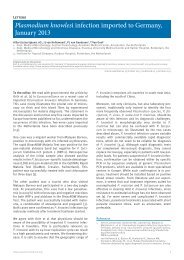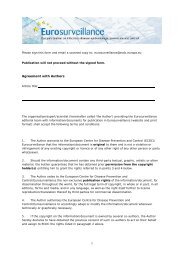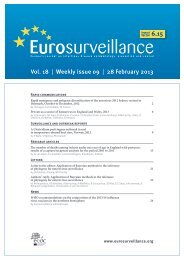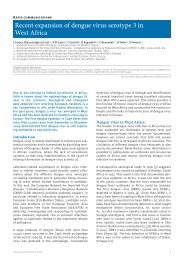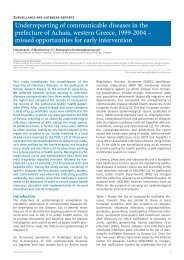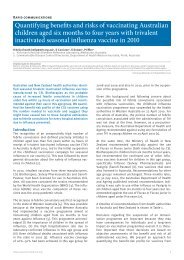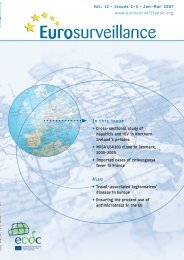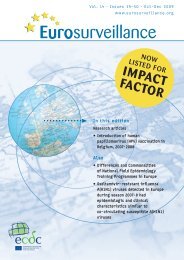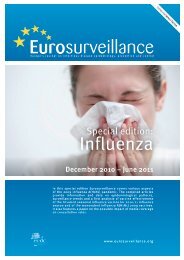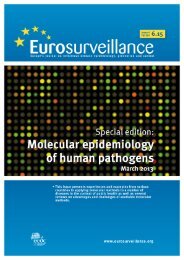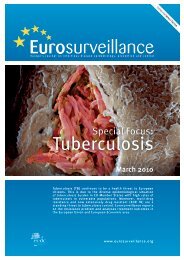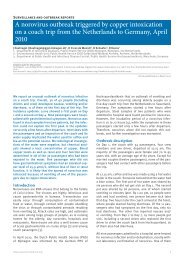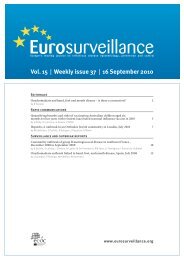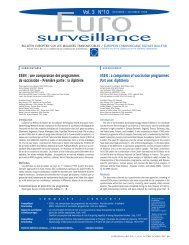In this edition Also - Eurosurveillance
In this edition Also - Eurosurveillance
In this edition Also - Eurosurveillance
You also want an ePaper? Increase the reach of your titles
YUMPU automatically turns print PDFs into web optimized ePapers that Google loves.
Special issue: Molecular typing for public health purposes<br />
Perspectives<br />
A Eu r o p E A n lA b o r At o r y n E t w o r k f o r s E q u E n c E - b A s E d<br />
t y p i n g o f m E t h i c i l l i n- r E s i s tA n t St a p h y lo c o c c u S a u r e u S<br />
(mrsA) A s A co m m u n i c At i o n p l A t f o r m b Et w E E n h u m A n<br />
A n d v E t E r i n A r y m E d i c i n E – A n u p d A t E o n sE qn E t.o r g<br />
A. W. Friedrich (alexf@uni-muenster.de) 1 , W Witte 2 , H de Lencastre 3,4 , W Hryniewicz 5 , J Scheres 6 , H Westh 7 , SeqNet.org<br />
participants 8<br />
1. <strong>In</strong>stitute of Hygiene, University Hospital Münster, Münster, Germany<br />
2. Robert Koch <strong>In</strong>stitute, Wernigerode Branch, Wernigerode, Germany<br />
3. Laboratory of Molecular Genetics, <strong>In</strong>stituto de Tecnologia Quimica e Biologica (ITQB), Oeiras, Portugal<br />
4. Laboratory of Microbiology, The Rockefeller University, New York, United States<br />
5. Division of Microbiology, National Medicines <strong>In</strong>stitute, Warsaw, Poland<br />
6. University Hospital Maastricht, Maastricht, the Netherlands<br />
7. Department of Clinical Microbiology, Hvidovre Hospital, Hvidovre, Denmark<br />
8. 44 participating European laboratories (listed in Table 1)<br />
<strong>In</strong>troduction of SeqNet.org<br />
SeqNet.org is currently an initiative of 44 laboratories from 25<br />
European countries and one laboratory from Lebanon (Table 1),<br />
founded in 2004, in collaboration with the Robert Koch <strong>In</strong>stitute<br />
at the University of Münster, Germany (http://www.SeqNet.org).<br />
Since then, its main objective is to establish a European network<br />
of excellence for sequence-based typing of microbial pathogens,<br />
having its main focus on Staphylococcus aureus [1]. SeqNet.<br />
org comprises a large number of national reference laboratories<br />
as well as university laboratories. The principle goal of SeqNet.<br />
org is to generate unambiguous, easily comparable typing data in<br />
electronic, portable form to be used by infection control at a local<br />
level as well as national and European surveillance of sentinel microorganisms,<br />
such as methicillin-resistant Staphylococcus aureus<br />
(MRSA). spa-typing has been shown to be a useful tool in molecular<br />
hospital epidemiology [2,3]. Veterinary laboratories have recently<br />
joined the SeqNet.org initiative as MRSA has become an emerging<br />
problem in veterinary medicine [4,5]. spa-typing data from human<br />
and veterinary medicine can be compared using the spa server<br />
database [6].<br />
SeqNet.org objectives<br />
1. Organisation and participation in seven international workshops<br />
contributed to the harmonisation of sequencing methods for<br />
sequence-based typing of MRSA and the capacity for building<br />
DNA sequencing in diagnostic microbiology. Further meetings<br />
and workshops are planned.<br />
2. SeqNet.org rules require that SeqNet.org laboratories (Table 1)<br />
undergo at least one certification trial [7] for sequence-based<br />
typing of MRSA. Regular proficiency tests are foreseen.<br />
3. Curatorship of the Ridom spa server and the development and<br />
maintenance of a SeqNet.org web-portal allows the transfer of<br />
data at an international level.<br />
4. The excellence of data quality needs to be maintained. This is<br />
necessary as the access to the spa server will be enlarged in<br />
the future.<br />
SeqNet.org database<br />
SeqNet.org is co-ordinated by the University Hospital in Münster<br />
and the Robert Koch <strong>In</strong>stitute in Wernigerode, Germany. Besides<br />
ensuring the quality aspect, SeqNet.org is responsible for curating<br />
the spa server for all laboratories using the spa server. Currently, the<br />
44 SeqNet.org participating European laboratories (Table 1, Figure)<br />
and 148 other laboratories submitting data have synchronised more<br />
than 3,816 spa types consisting of 222 spa repeats from 59,401 S.<br />
aureus strains of which 93% were MRSA. The analysis of more than<br />
27,000 spa server submissions show that the 30 most frequent<br />
spa types cover 66% of all submissions (Table 2).<br />
Figure<br />
Proportion of strain submissions with complete data set to the spa<br />
server, by country in Europe, SeqNet.org curated Ridom spa server,<br />
1 April 2004 – 15 February 2008 (n = 32,544)<br />
166 EUROSURVEILLANCE Vol. 13 · Issues 14–26 · Apr–Jun 2008 · www.eurosurveillance.org<br />
n = 32.544<br />
no data<br />
< 1%<br />
1% to 5%<br />
6% to 10%<br />
> 10%



